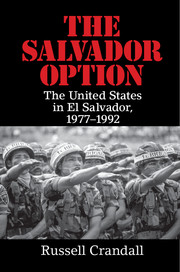Book contents
- Frontmatter
- Dedication
- Epigraph
- Contents
- List of Figures
- List of Organizations
- Acknowledgments
- 1 Introduction
- PART ONE EL SALVADOR IN THE COLD WAR
- PART TWO JIMMY CARTER
- PART THREE RONALD REAGAN
- 19 Reagan Arrives
- 20 Reagan and Salvador
- 21 El Mozote
- 22 Another Vietnam
- 23 Solidarity
- 24 Troop Cap and Certifying Human Rights
- 25 Reagan Gambles on Elections, 1982
- 26 The Shultz Doctrine
- 27 Human Rights
- 28 Henry Kissinger
- 29 Contras
- 30 “Elections Yes, Dialogue No,” 1984 Presidential Election
- 31 La Palma
- 32 Esquipulas
- 33 Counterinsurgency I
- 34 Counterinsurgency II
- 35 Zona Rosa
- 36 Air War
- 37 José Napoleón Duarte
- 38 Iran-Contra
- PART FOUR GEORGE H. W. BUSH
- PART FIVE POSTWAR
- Notes
- Bibliography
- Index
27 - Human Rights
from PART THREE - RONALD REAGAN
Published online by Cambridge University Press: 05 June 2016
- Frontmatter
- Dedication
- Epigraph
- Contents
- List of Figures
- List of Organizations
- Acknowledgments
- 1 Introduction
- PART ONE EL SALVADOR IN THE COLD WAR
- PART TWO JIMMY CARTER
- PART THREE RONALD REAGAN
- 19 Reagan Arrives
- 20 Reagan and Salvador
- 21 El Mozote
- 22 Another Vietnam
- 23 Solidarity
- 24 Troop Cap and Certifying Human Rights
- 25 Reagan Gambles on Elections, 1982
- 26 The Shultz Doctrine
- 27 Human Rights
- 28 Henry Kissinger
- 29 Contras
- 30 “Elections Yes, Dialogue No,” 1984 Presidential Election
- 31 La Palma
- 32 Esquipulas
- 33 Counterinsurgency I
- 34 Counterinsurgency II
- 35 Zona Rosa
- 36 Air War
- 37 José Napoleón Duarte
- 38 Iran-Contra
- PART FOUR GEORGE H. W. BUSH
- PART FIVE POSTWAR
- Notes
- Bibliography
- Index
Summary
It is clear that the United States won't permit the left to take power in El Salvador. I don't think there is any way [for the United States] to manage this war without a direct confrontation.
– FMLN spokesman, April 1984The masas [civilians who support the insurgency] are the same as the guerrillas. They are not innocent.
– Captain Luís Mario Águilar Alfaro, FAES Chiefs of Staff spokesperson, March 1984Journalists, Tell the Truth!
– Pro ARENA Bumper Stickers in San Salvador, 1982–1983As President Reagan's first term in office wore on, the United States’ effort to bolster El Salvador's precarious democracy and abusive and inept military did not appear to be succeeding. The bad news out of El Salvador just kept coming. For example, on September 23, 1983, the Salvadoran Air Force indiscriminately bombed the small town of Tenancingo, leaving 50 civilians dead – a grisly episode that deeply frustrated U.S. military trainers. Of critical concern to the robust and still bitter debate in Washington over U.S. policy, El Salvador continued to be a “disaster zone” for human rights, although the numbers of reported disappearances and massacres had ebbed from the height of a few years earlier.
Key Reagan officials’ comments and actions periodically revealed ambivalence if not outright hostility to human rights. This often occurred when Reagan officials claimed that the death squads were shadowy forces and thus very difficult to control. For example, Reagan's top diplomat for human rights, Elliott Abrams, in August 1983 stated, “We don't know who is behind the death squads.”
Even more than security force abuses or embarrassments, such as the Tenancingo bombing, the wanton killings by the death squads were a public relations nightmare for the Reagan administration, which had decided to embrace the grin-and-bear it approach and focus on reform and elections to save El Salvador from communism. A difficult question, though, is whether the increased rhetoric on human rights that began in late 1982 and early 1983 was in fact genuine – or just more appetite suppressant for a Congress obsessed with human rights when in fact officials’ key concern was checking the Marxist guerrilla advance.
- Type
- Chapter
- Information
- The Salvador OptionThe United States in El Salvador, 1977–1992, pp. 287 - 299Publisher: Cambridge University PressPrint publication year: 2016



